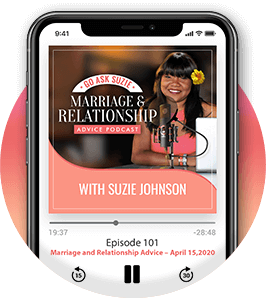![]() Suzie, I had an extramarital affair with a woman at work. How do I forgive myself for having betrayed my wife? She is such a wonderful person. Every time I see the hurt in her eyes, I feel like a total lowlife. I have caused her so much pain and hurt. She didn’t deserve this. Now, I’m having a really hard time forgiving myself for what I did. Please help! –Deep Regret
Suzie, I had an extramarital affair with a woman at work. How do I forgive myself for having betrayed my wife? She is such a wonderful person. Every time I see the hurt in her eyes, I feel like a total lowlife. I have caused her so much pain and hurt. She didn’t deserve this. Now, I’m having a really hard time forgiving myself for what I did. Please help! –Deep Regret
![]() As I was thinking about how best to answer your question, I was reminded of a story about a World War II submarine. Let me share it with you. Picture the scene: The time is December 1942, right in the middle of the Second World War. There’s an Allied submarine out in the middle of the Atlantic Ocean, operating at Level 3, Full Silent Alert. Why? A Nazi sub-destroyer is circling directly above them, hunting for prey.
As I was thinking about how best to answer your question, I was reminded of a story about a World War II submarine. Let me share it with you. Picture the scene: The time is December 1942, right in the middle of the Second World War. There’s an Allied submarine out in the middle of the Atlantic Ocean, operating at Level 3, Full Silent Alert. Why? A Nazi sub-destroyer is circling directly above them, hunting for prey.
The atmosphere in the sub is harrowing.
Sailors are motionless. Engines off. The men aren’t allowed even a whisper (hand signals only), for fear of being detected, which of course would mean certain death.
As everyone is focusing on being quiet (and doing their best to keep from panicking), suddenly, out of the blue, a sailor drops a large steel wrench on the metal decking.
The boat rings like a church bell on Sunday morning, immediately giving away the sub’s location.
The Nazis respond by raining down MK3 anti-sub depth charges like hail in a thunderstorm.

Being well targeted, the bombs find their mark and the submarine is severely damaged.
A mechanic reports to the captain, “Skipper, our engines are toast, the electricity is out, and the hull has been breached. We’re taking on water like crazy!” As the boat sinks deeper and deeper (several hundred feet beyond its demonstrated hull safe depth), most of the men begin to wonder to themselves, “Is this the end?”
Now, if you were the captain on this sub, there are several things you couldn’t afford to do right now. You wouldn’t start a court-martial proceeding for the man who dropped the wrench. This just isn’t the time or the place for that. You wouldn’t undertake an investigation into how a well-trained sailor could have acted so irresponsibly during such a critical moment, risking the lives of everyone on board the sub.
But what if YOU had been the man who dropped that wrench? At this point, would it do any good for you to let yourself become so wracked by guilt that you couldn’t continue to perform your duties? I don’t think so.
In fact, the more guilt this sailor indulges, the more he endangers himself and those around him.
As it turned out, this sailor understood these facts and so did his crew and captain. Rather than waste time on blame, shame, or reproach, they pulled together and worked as a team.
The good news is they survived, and a few days later, the damaged vessel limped its way back into harbor. Soon after, the sailor was court-martialed and his fellow officers and commander were asked to testify, either for or against him.
What’s interesting is that all 90 of his peers chose to testify on his behalf. They told of how the mistake easily could have been theirs, and when they were asked if they would feel comfortable serving with the sailor again, all answered yes. When they were asked why, they told the court of the sailor’s quickness to overcome and continue to perform despite having made a mistake. In their eyes, his willingness to step up — even when he’d fallen down — made him a hero.
What does this all mean for you?
Stop for a moment and think about it this way:
What if the sailor had beaten himself up with guilt, wallowed in self-pity, and failed to forgive himself quickly for his mistake? How much more danger might he have caused his crew? How much less effective would he have been in the crisis?
If he had reacted like that, how do you think his peers would have felt about him as they later looked back at the situation? Do you think they would have been so quick to support him and vouch for him throughout the trial? (Especially if he had NOT been able to pull himself together emotionally, recover from his mistakes, and help them save the boat?)
I don’t imagine they would. Part of what I understand about the unwillingness of human beings to forgive themselves (and others) for mistakes is this:
It doesn’t help anybody. I believe carrying guilt and unforgiveness always does more harm to you and those you’ve hurt, than simply letting go.
Here’s the deal.
No matter what happened, you can always find a reason to blame yourself, blame others, blame your marriage, or blame life itself. When you think about it, you can punish yourself with guilt for the rest of your life. No one can stop you. You can drag the baggage of past mistakes all the way with you to the grave.
If you wish…
…you can nail yourself to the cross of your mistakes each and every day. No one can stop you. It’s your choice. The only question is… why would you choose to?
Look at it this way:
Like the sailor who dropped the wrench, you have the power to forgive yourself. You can know that you are human, and decide to overlook your mistakes and let yourself off the hook. BOTH choices are yours to make.
What is the key to making the choice to forgive yourself?
It can be summed up in one word: permission. Often, that’s what makes self-forgiveness such a challenge. Too many of us are waiting for a sign or for someone else to come along and give us permission to let go of our past.
Newsflash: THERE IS NO ONE HANDING OUT PERMISSION SLIPS!
Like breathing, sneezing, and walking… forgiving yourself is something YOU have to do FOR YOURSELF.
That’s a good question. If you find that you’re having a hard time giving yourself permission to forgive yourself, then chances are, you’re experiencing some confusion. The first confusion comes from not fully understanding the nature of mistakes. The second confusion comes from not fully understanding the nature of forgiveness.
Let’s start by clearing up some of that confusion right now…
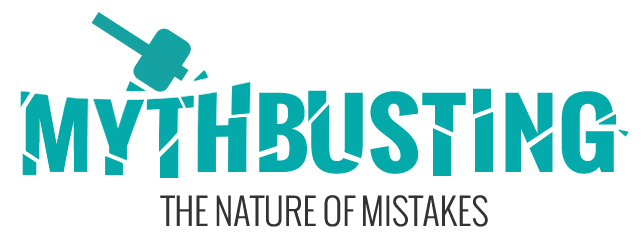

Myth: Mistakes can only be made accidentally.
Truth: Mistakes can occur both deliberately and accidentally, as long as the person making the mistake is subject to false or incorrect information about the outcome of the action he or she is about to take. (And since no one can predict the future with 100% accuracy, what might seem like a harmless action can turn out to be a colossal mistake.)

Myth: Mistakes are a sign of failure.
Truth: Mistakes are feedback mechanisms. They simply reflect back the fact that some part of your thinking was incorrect.

Myth: Mistakes are unnatural. They are signs of weakness.
Truth: Mistakes are natural to all human beings. The only unnatural thing… is having an expectation of perfection.

Myth: Mistakes can be corrected through guilt, punishment, or unforgiveness.
Truth: Neither guilt, punishment, nor unforgiveness corrects mistakes. The only thing that corrects mistakes is learning success.

Myth: Some things are unforgivable.
Truth: Forgiveness has no exceptions… no conditions… no hierarchy. “Mistakes are always forgivable, if one has the courage to admit them.” – Bruce Lee

Myth: Forgiveness equals condoning.
Truth: Forgiveness is correcting. It doesn’t approve of mistakes; it seeks to correct them.

Myth: Forgiveness is a one-time event.
Truth: Forgiveness is the practice of letting go.
Give yourself permission because
- You are a human being. Therefore, you’re subject to making mistakes. (In this, you have no choice. Therefore, mistakes both big and small call for forgiveness.)
- You don’t need to be perfect in order to love yourself. (Perfection isn’t a goal; it’s a disease. Forgiving yourself is a sign of healthy self-esteem.)
- You didn’t invent mistake-making. (Therefore, take no credit for your mistakes. Simply learn and move on.)
- And perhaps the best reason of all: It’s better for you to forgive yourself, because you’ll be way more effective, more loving, more successful, more compassionate, and more temptation-proof when you’ve given yourself permission to accept forgiveness for your mistakes.

Let’s take it deeper.
Your desire to forgive yourself must now become more than a wish or a fantasy. It’s time to take it into reality. You do this by daily practice. Just as if you were doing meditation or yoga, the more you practice, the more you will experience the benefits.
With that said, here are six tips to get you started:
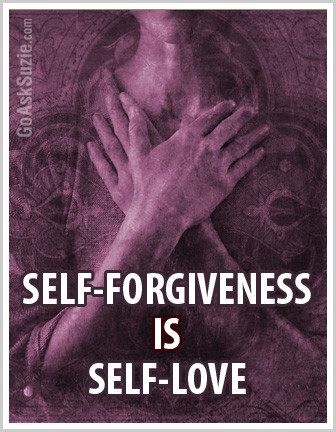
Six Tips for Practicing Self-Forgiveness
- Admit — when you make mistakes. As a mistake maker, you’re gloriously human. (You’re not supposed to be perfect.)
- Remind yourself — that all of us are doing the best we can with the level of understanding we have at any moment in our lives (including you).
- Let go — of past-future thinking. (Stay present. Stay in the now.)
- Confront — your self-deception and inner conflicts. (Don’t lie to yourself.)
- Accept yourself — unconditionally, warts, flaws, and all. (If you don’t do this, no one else will.)
- Shift focus — from making mistakes, to learning success. (Your mistakes have contributed to your growth and have helped make you who you are.)
Here’s the thing to understand about forgiving yourself:
Self-forgiveness is a sign of self-love.
Every thought you direct at yourself is either an unforgiving thought or a forgiving thought. People who choose to direct unforgiving thoughts at themselves usually don’t have a very healthy self-esteem. People who ONLY direct forgiving thoughts toward themselves will normally end up developing and maintaining high self-esteem. In other words… self-forgiveness equals self-esteem. (You simply can’t have one without the other.)
Here’s a quote I saw the other day. (I think it explains what we’re talking about pretty well.)
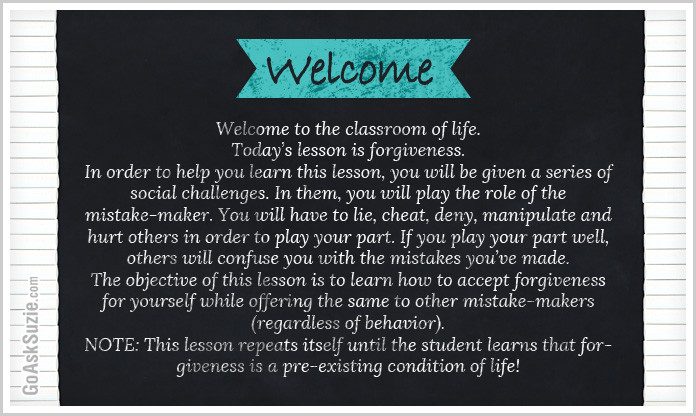
Just makes sense, doesn’t it?
So, the question isn’t IF your mistakes are worthy of forgiveness, because they are. The real question is this: Are you willing to learn the lessons this mistake was trying to teach you? If you are, then permission to forgive yourself is automatically granted.
For more help on embracing self-forgiveness, download and listen to my Wayward Partner’s Complete 7-Step Infidelity Recovery coaching program. Included is a program called Self-Forgiveness: Letting Go of Guilt, Shame & Pain. In this session, I go much deeper into the actual process of accepting forgiveness for yourself, and I coach you through many of the obstacles that try to block that process… including guilt, unworthiness and fear.
Here’s an infographic so we can recap everything we’ve talked about when it comes to understanding Myths vs Facts of Mythbusting:
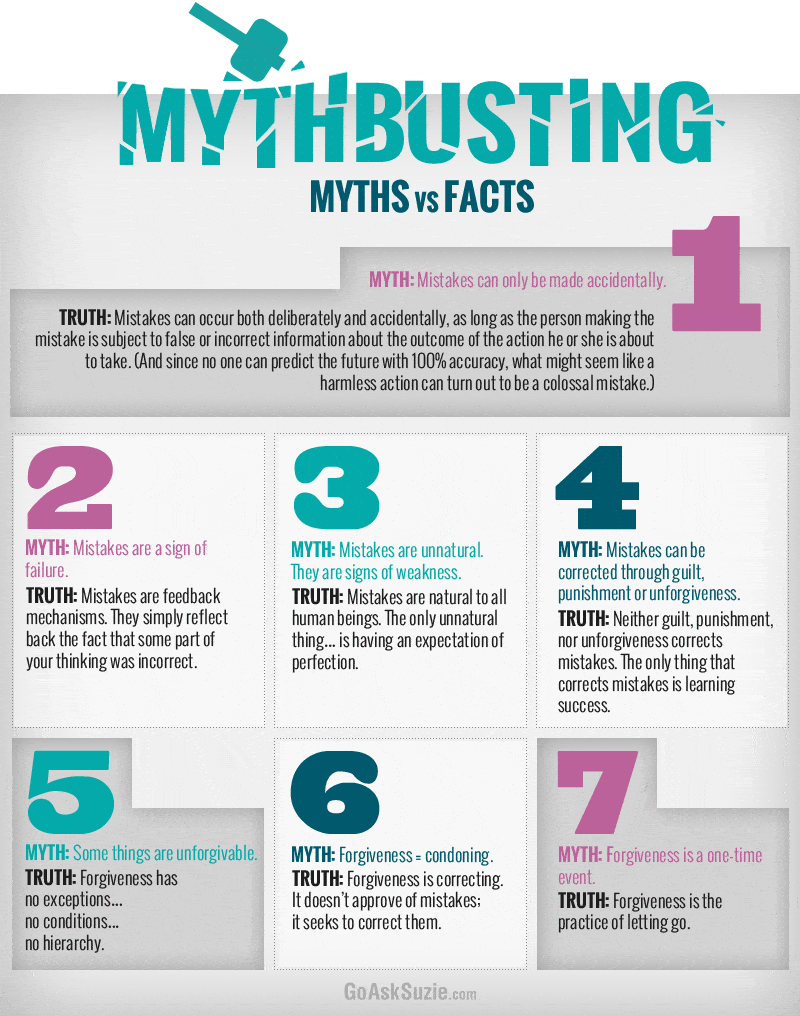
And one more thing… (it’s important)
Learning to forgive yourself is a skill.
It’s a life lesson everyone has to learn, and until you do, you’ll have difficulties advancing spiritually, mentally, and emotionally throughout your life.
Learning to forgive yourself after your affair is something you can do and something worth doing.
Until we speak again…
Remember… Love Wins!

Don’t forget… You can now get over 13.5 hours of my best Wayward Partner strategies. Learn More Here





